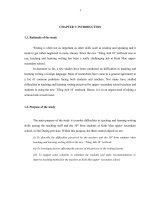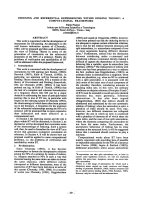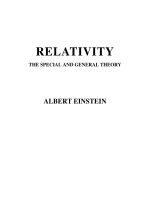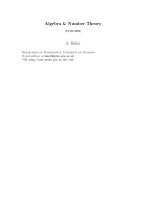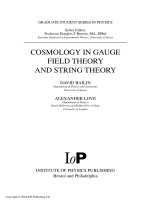Adult teaching and learing theory a psychoanalytic investigation
Bạn đang xem bản rút gọn của tài liệu. Xem và tải ngay bản đầy đủ của tài liệu tại đây (23.33 MB, 250 trang )
Adult Teaching and Learning Theory:
A Psychoanalytic Investigation
JniverSityof Nottingham
HaH!
vtrardLibrary
By Lindsay Davies
BA Hons, MA (Sheffield), MA (Nottingham)
Thesis submitted to the University of Nottingham
for the degree of Doctor of Philosophy
July 2010
Abstract
The overarching aim of this thesis is to enhance the theoretical status of postcompulsory education by effecting a non-empirical, psychoanalytic examination of
adult teaching and learning theories. The study arises out of the observation that - in
comparison with disciplines within the Social Sciences, Arts and Humanities psychoanalytic perspectives are both underemployed in practical contexts and have
negligible theoretical impact within this field.
The study provides a contribution to educational theory and practice through the
development of a postmodern psychoanalytical methodology and its methods. These
are operationalised through the development of a suite of tools based on Jung's
(1971) the theory of psychological types. Thisinvolves the adaptation of Jung's
psychological categories into epistemological characteristics that are then used to
identify strengths, contradictions and omissions within theoretical material. The resulting
Jungian Typological Instrument (JTI)is applied to selected case study topics that
reflect contemporary discourses, theories and concepts within the field of adult
teaching and learning.
In order to demonstrate the effectiveness of the JTIit is applied to two case study
topics and critically examines their theoretical underpinnings. The first of these topics is
the 'micro' model of reflection-in-action, which is drawn from Schön's (1983)
formulation of reflective practice. The larger, 'macro', discourse of lifelong learning
forms the second case study as articulated in the UNESCOreport Learning to Be
(Faure et at.: 1972) and the Green Paper The Learning Age (DfEE1998). The insights and
outcomes arising from these analyses form the evaluation process for the methods.
As psychoanalytic approaches are not unproblematic, this investigation incorporates
philosophical reflection and conceptual analysisas meta-level evaluation strategies
ii
for the methodological level of the study. Thisdual-level evaluation reveals that the
proposed methodology and methods together offer a robust and trustworthy
approach to theoretical analysis, which has potential applications for both theory and
practice within the adult teaching and learning context.
111
Acknowledgements
Thisstudy has provided me with the invaluable opportunity of studying the field that I
love, and I am grateful for this privilege, which has been made possible through ESRC
funding.
I am also indebted to my supervisors, ProfessorMal Leicester and Dr. John Wallis, for
their generosity in offering their valuable expertise and insight in support of this project.
My dearest thanks go to my son James and partner Chris who have provided the love
and encouragement needed to bring this to completion. And, without the unflagging
support and good humour of my dear friends, Tina Byrom and Anne O'Grady, I could
never have survived the long and lonely journey that is a PhD.
Thank you all.
Lastly, I dedicate this thesis to my mother, Doreen, who did not see this work
completed.
iv
Listof figures
Figure 1
UKCPmodalities of psychotherapy
Figure 2
Topographical representation of the psyche
Figure 3
Jungian structure of the psyche
Figure 4
Conscious and unconscious domains of the psyche
Figure 5
Differing degrees of consciousness
Figure 6
Application of the methodology and tools
Figure 7
Evaluation strategy of the study
Figure 8
The syzygy formed by the attitudes
Figure 9
Example of an introverted personality
Figure 10
Relationship of the functions
Figure 11
Example of extraverted sensation with auxiliary feeling
Figure 12
Example of extraverted sensation with auxiliary feeling and
tertiary thinking
Figure 13
JT1Map for reflection-in-action
Figure 14
Comparison of the JTIMaps for Learning to Be and
Learning to Succeed
Figure 15
Three kinds of knowledge about the social world
-'
__
_`
List of tables
Table I
Scheler's typology of knowledge (1926)
Table 2
Typological compensatory configurations
Table 3
Example of the JTIGrid in use
Table 4
Factors in the choice of case study topics
Table 5
JTIGrid for reflection-in-action
Comparison of the JTIGrids for Learning to Be and
Table 6
Learningto Succeed
vi
Listof appendices
Appendix A
Overview of aims, objectives and research questions
Appendix B
'Family tree' of psychoanalytic schools
Appendix C
Glossary of psychoanalytic terms
0
vil
Abbreviations
BERA:
BPS:
BritishEducational Research Association
BritishPsychological Society
DfEE:
Department for Education and Employment
DfES:
Department for Education and Skills
DIUS:
Department for Innovation, Universities and Skills
ESRC:
Economic and Social Research Council
Further Education National Training Organisation
FENTO:
1TE:
Initial Teacher Education
JTI:
Jungian Typological Instrument
MBTI:
Myers-BriggsTypological Indicator
MACE:
National Institute of Adult Continuing Education
OECD:
Organisation for Economic Cooperation and Development
ODE:
PESGB:
PGCCE:
RAE:
Oxford Dictionary of English
Philosophy of Education Society of Great Britain
Postgraduate Certificate in Continuing Education
Research AssessmentExercise
QCA:
Qualifications and Curriculum Authority
UKCP:
United Kingdom Council for Psychotherapy
UNESCO:
United Nations Educational, Scientific and Cultural Organization
Vill
Table of contents
Title page
Abstract
Acknowledgements
List of figures
List of tables
List of appendices
Abbreviations
Table of contents
Foreword
Chapter One: Introduction
Introduction
Contribution
Outline of the theoretical
to the study
3
of the MA in Research Methods
10
framework
14
and reflexive stance
Intended
contribution
Outline of the chapters
20
22
Chapter Two: Literature Review
An outline of adult teaching
Introduction
28
and learning
29
Psychoanalysis
38
Research methods in education
Omissions within the literature
49
Conclusions
50
Chapter Three: Psychoanalytic
Context
Introduction
Psychoanalytic
Addressing
53
and assumptions
54
Critiques of psychoanalysis
64
underpinnings
the critiques concerning
47
truth and knowledge
claims
72
Chapter Four: Methodological Reflections
Introduction
Proposed methodology
Evaluation
Relevance,
77
83
strategy
91
Description and discussion of the methods
94
strengths and weaknesses of the methodology
Methodological
Choice
and methods
115
contribution
117
of case study topics
118
ix
Chapter Five: Reflection-in-action
- Case Study 1
Outline of reflection-in-action
123
JTI analysis: reflection-in-action
126
Comparison
with key critiques
139
Discussion and summary
143
Chapter Six: Lifelong Learning - Case Study 2
Outline of lifelong learning
147
JTI analysis: lifelong learning
153
with key critiques
170
Discussion and summary
174
Comparison
Chapter Seven: Philosophical
Introduction
176
material'?
178
from 'practice'?
182
What is meant by 'typology'?
187
What is meant by 'theory'
and 'theoretical
How is this different
What is meant by the term 'knowledge'
Reflections
and what is its relationship to
188
'perception'?
Outcomes
and observations
Chapter Eight: Evaluation of the Methodology
193
and Methods
Introduction
196
Evaluation of the methodology
196
Evaluation
of the methods
198
Further observations
201
Recommendations
202
Conclusions
202
Chapter Nine: Implications for Theory and Practice
Implications for pedagogic theory
206
Implications
for pedagogic
practice
208
Considerations
for pedagogic
research
210
Recommendations
211
X
Chapter Ten: Summary
Conclusions
214
Future research
217
Concluding remarks
218
Concluding material
References
Appendices
220
234
Appendix B: 235
Appendix C:
236
40
X1
Foreword
Based within the School of Education at the University of Nottingham, this thesis forms
the second part of a "1+3" research training programme funded by the Economic
and Social Research Council (ESRC)with the initial year comprising an MA in 'Social
Sciences Research Methods: Continuing Education'. The MA dissertation and the PhD
thesis within this programme were designed in line with the then current Thematic
Prioritiespresented by the ESRCin September 2000. ThisPhD study addresses the
Thematic Priority of 'Research issuesconcerning Knowledge and Understanding' with
specific reference to the question 'What are the different forms and structures of
knowledge? '
Whilst the thesis is primarily concerned with the analysis of theoretical material, its
findings have direct implications for the practice of adult teaching and learning (as
discussed in Chapter Nine). Thisincludes the potential to address the additional
Thematic Priority of 'Research issuesconcerning Learning and Teaching', namely:
How does understanding of the learning process translate into effective
teaching?
2)
What is the nature of lifelong learning, is it being delivered and how does it
relate to acquisition of new and flexible skills?
3)
How can motivation and engagement in the learning process be increased?
It is anticipated that these further Thematic Prioritiesmay be addressed through a
subsequent adaptation of the PhD outcomes within practical pedagogical
contexts.
4
xil
The highly conceptual and abstract nature of this study has naturally lent itself to a
presentational style that uses frequent graphical representations and adopts the use
of sustained metaphorical devices to illustrate analytical processes and theoretical
content. The most central of these is a cartographic metaphor, which offers a rich and
lucid mode of representing the complex territory herein. The imagery of mapping
within two-dimensional space is intended as a heuristic device and represents my own
preferred way of formulating and expressing the development of my arguments.
x ill
Chapter One: Introduction
Chapter Two: Literature Review
Chapter Three: Psychoanalytic
Chapter
Four: Methodological
Context
Reflections
Introduction
to the study
What is psychoanalysis?
Background
Background
to the study
to the methodology
Contribution of the MA in Research Methods
Background
to the MA dissertation
Outline of the MA dissertation
Findings of the MA dissertation
Impact upon the PhD study
Outline of the Theoretical
Framework and Reflexive Stance
Intended Contribution
Outline of the Chapters
Chapter Two: Literature review
Chapter
Chapter
Chapter
Three: Psychoanalytic
Four: Methodological
Five: Reflection-in-action
context
reflections
Case
Study
1
-
Chapter Six: Lifelong learning - Case Study 2
Chapter Seven: Philosophical reflections
Chapter Eight: Evaluation of the methodology and methods
Chapter
Nine: Implications
for theory and practice
Chapter
Ten: Summary
2
Chapter One: Introduction
I want to combine a belief that it is a good thing to think rationally and
rigorously and systematically about the world and a good thing to be
open to the richness, complexity and unexpectedness of our
experience of the world. It is easy to let one get in the way of the other.
(Psychoanalysis: A Critical Introduction, Crab 2001:viii)
Introductionto the study
The following thesis presents a research project that aims to enhance non-empirical
research methods and theoretical perspectives in adult teaching and learning via the
development of a psychoanalytically informed methodology. The impetus for this
investigation emerged from the observation that the field of education is dominated
by empirical research methods and that psychoanalytic perspectives are largely
absent from adult pedagogy. The study's primary Intention is to develop a
psychoanalytically-informed
methodology and trial a new analytical tool, the Jungian
Typological Instrument (JTI).Thiswill fulfil a secondary objective of interrogating the
theoretical bases of two case study discourses and models which are influential within
contemporary debates surrounding adult pedagogy, as identified by the literature
review (Chapter Two). Thisdual-level approach aims to demonstrate the relevance of
the psychoanalytic methodology and the robustness of the JTIwhilst generating
critiques of the epistemological bases of the case study topics.
A key driver for this study is the argument that the field of post-compulsory education is
under-theorised from a psychoanalytic perspective (Tennant 1997) yet this approach
has informed research methodologies in other disciplinary areas, such as the Arts and
Humanities. In response to that omission, it is proposed here that this unexploited
approach may be used to highlight some of the largely unchallenged theoretical
assumptions inherent within current educational orthodoxies and their dominant
practical models. The study seeks to address these problems by providing a
3
methodology and methods for supporting an increased coherence at a theoretical
level and, by extension, the potential for more satisfactory practical applications for
teaching and learning.
Therefore, the study's overarching aim is to enhance the theoretical status of adult
pedagogy by effecting a non-empirical, text-based, examination of key case studies;
focusing specifically on theoretical foundations yet also acknowledging the resulting
implications for practice. The project intends to fulfil this aim by the operationalisation
of the following objectives:
1) to foreground the role of purely theoretical investigation within educational
studies;
2)
to develop a psychoanalytic methodology and locate it within a postmodern
paradigm;
3)
to demonstrate the appropriateness of using psychoanalytic perspectives
within educational investigations by producing a coherent critique of dominant
large-scale (macro) and small-scale (micro) orthodoxies within adult teaching
and learning;
4) to identify and critique the epistemological bases of these contemporary
educational discourses;
5)
to contribute to existing knowledge by informing educational theory and
practice.
The rationale behind the scope and focus of the objectives is threefold and is
delineated by the study's underlying research questions, themselves operating over
two levels:
Methodological-level
issues:
1) Towhat extent are psychoanalytic perspectivesappropriate to educational
inquiry?
t
-4
2)
How can psychoanalytic theory contribute to our understanding of adult
education, and the teaching and learning process?
Topical-level issues:
3)
What are the underlying epistemological assumptions on which selected postcompulsory pedagogies are founded?
It is proposed that - by addressing the aim, objectives and research questions outlined
above - it will be possible to shed new light on the rigour and efficacy of both
theoretical and practical aspects of adult teaching and learning. An overview of
these aims, objectives and research questions is produced in Appendix A.
What Is Psychoanalysis?
Psychoanalysis is a set of theories and therapeutic practices that includes models of
human psychological development and aims to address psychopathology in the form
of emotions, behaviours, thoughts and perceptions. Founded by Sigmund Freud (18561939), an Austrian neurologist, it is a form of psychotherapy that assertsthe role of both
innate and environmental factors in psychological development. In professional terms
it is categorised as a psychodynamic approach, that is,
A psychological model in which behavior [sic) is explained in terms of
past experiences and motivational forces; actions are viewed as
stemming from inherited instincts, biological drives, and attempts to
resolve conflicts between personal needs and social requirements.
(B(tish Psychological Society 2008)
In psychodynamic theories, the personality and behaviour are moulded by inner
forces that can be out of the conscious control of the subject but can be accessed by
psychotherapeutic interventions such as psychoanalysis. The United Kingdom Council
for Psychotherapy (UKCP)identify eight modalities (Fig. 1) or types of psychotherapy,
which include psychoanalysis and Jungian analysis (also known as Analytical
Psychology).
Psychoonslysla
Junglan
AnslYSls
Cognitive
psychotherapies
Psychotherapy
with children
& adolescents
Psychotherapeutic
counselling
UKCP
Modalities
of
constructive
psycho-
ý
therapies
Psychotherapy
Family,
Hypnopsychotherapy
couple,sexual
and systemic
therapies
Humanistic&
Integrative
psycho-
therapies
Figure-1: UKCPmodalities of psychotherapy (UKCP2008a.)
The aim of each of these modalities is to support clients (individually, in couples,
groups or families) in gaining 'insight into their difficulties or distress,establish a greater
understanding of their motivation, and enable them to find more appropriate ways of
coping or bring about changes in their thinking and behaviour' (UKCP2008b.) through
varieties of talking interactions with a therapist. In these encounters clients have the
space to safely explore their issuesin a meaningful way.
Historically, psychoanalysis is the earliest of these approaches, it was invented by
Freud in the 1890's as treatment for neurotic conditions which took the form of a
'talking cure' -a term coined by 'Anna 0. ' one of Freud's early cases Wollheim 1971).
A typical sessionof Freudian psychoanalysis would involve spontaneous verbal
interactions or 'free association', which involves the client speaking, without
reservation, about the ideas, memories and feelings generated through their
interaction with the therapist. From these communications the therapist is able to
facilitate an exploration of unconscious issuesthat may be the cause of psychological
or physical symptoms. Important expressionswithin Freudian psychoanalysis include
'transference', 'resistance' and 'repression', these and other terms are explained in
Chapter Three and the glossary at the end of the study. Thisinvestigation focuses on
different key concepts arising from Jung's Analytical Psychology, one of the schools of
psychoanalysis emerging out of early theoretical schismswithin the discipline. The
ideas and practices of these approaches are discussed further in Chapters Two and
Three, and additionally a diagram of the 'family tree' of psychoanalytic schools can
be found in Appendix B.
Background to the Study
Interest in this topic springs from two main sources; the first of these being a personal
concern encountered within my own teaching practice in further and higher
education. In practice there are numerous pedagogical models that are treated as
self-evident expressions of the teaching and learning process, perhaps the most
pervasive and persuasive of these being the wealth of material on individual learning
differences. From my professional perspective as a teacher and teacher-trainer, I have
noted that the implementation of certain dominant models within the classroom can
have a negligible positive effect upon the teaching and learning process. More
worryingly, as a teacher educator I have observed instances where their uncritical
application by teacher practitioners may actually be detrimental to the learners'
experience and their attainment of outcomes. A good example of this is the use of
learning styles as a mode of navigating individual difference. In my experience the
incorporation of various models into classroom activities (such as the Honey and
Mumford Learning Styles Questionnaire 1986; 1992), appears to be no more effective
ý
`,
'7
.
in supporting students' abilities to construct knowledge, master skillsor develop their
affective positioning than my merely adopting a random variety of approaches in
delivery and assessment.Thisobservation has been supported most influentially by
Coffield et al. (2004) whose critical review of thirteen such models concluded that
those purporting to be based on individual difference across learning style have, on
the whole, little supporting empirical evidence for their claims and poor theoretical
underpinnings:
It must be emphasised that this review has failed to find substantial,
uncontested and hard empirical evidence that matching the learning
styles of learner and tutor improves the attainment of the learner
significantly.
(Coffield et at. 2004:41)
Similarly,within the context of adult education practice the use of umbrella concepts
be
'lifelong
learning'
to
learning'
'experiential
such
as
often
appear
employed
and
uncritically as a priori orthodoxies, self-evident in meaning and beyond the need for
justification.
The second source of interest is my observation that there is currently a dearth of
psychoanalytic perspectives within educational theory and this is reflected in their
puzzling absence from mainstream research into adult learning and teaching. Brown
(2008) too has recently observed that psychoanalysis is strangely lacking from
pedagogies, especially those of higher education, and argues that it has a role to
play in our understanding of individuals, groups and educational organisations:
The idea that we engage a variety of unconscious processes to defend
against painful and threatening forms of knowledge, ideas, emotions
and desires is now a familiar one.. .Although psychodynamic theory
emerged out of attempts to relieve individual symptoms, it has
8
transcended its early medical focus to become a powerful lens for
describing and exploring the motives and behaviour of groups and
organisations in terms of function and dysfunction, denial,
scapegoating, delusional fantasies and so on.
(Brown 2008:3)
The limited uptake of psychoanalysis as an analytical lens is puzzling especially if as
Simons (2002:13) argues of Freud and other key thinkers within the European critical
tradition - '[these] precursors of contemporary theory can be deployed to as much
critical effect today as in their own time, ' and so it would seem that recent intellectual
trends have rendered many theoretical schema such as psychoanalysis, Marxism
and feminism - unfashionable. Considering Tennant's (2006:22) observations, this is a
surprising omission, as psychoanalysis ostensibly offers:
a source of clinical insight into the relationships among learners and between
teachers and learners;
-a
forceful theory that links individual identity with the way in which society is
organised;
-a
reference point for understanding psychoanalytic approaches to adult
development.
In response to this apparent lacuna, the PhD study intends to examine an approach
through which psychoanalytic thought might be effectively employed at a theoretical
level within the adult education context and exploring its philosophical bases, arguing
that it offers a suitable methodology for educational research. In short, it addresses the
undervaluing of non-empirical research methods and explores the under use of
psychoanalysis In educational research, theory and practice and looks to the
development of the JTIto address this. Through the application of the JTI,to macroand micro-level case studies, it intends to provide substantive analytical outcomes
relevant to pedagogic theory and practice.
:
ýýý
ýt..,
_
.ýý.:
:ýý
ýý
'
ý'":
ý9
Background to the methodology
The methods employed within this investigation draw upon the theoretical principles of
C. G. Jung's Analytical Psychology - and in particular his original writings on
psychological typologies (Jung 1971) - which are then 'triangulated' with elements of
philosophical analysis in order to provide a robust investigative tool. However, as
psychotherapeutics in general is a highly contested area of practice and theory with
a long history of critique including Eysenck (1952) and Cioffi (1998), a central objective
of the study is to locate psychoanalysis within ontological and epistemological
frameworks that are not only consonant with my own professional experiences and
personal positioning but can also be defended against generic critiques levelled at
modernist approaches or 'grand narratives' (Lyotard 1984) and the questionable
nature of various psychoanalytic practices.
Contribution of the MA in
s arch M tthhods}QthePhD study
As outlined above, the initial year of the ESRC-funded "1+3' programme comprised an
MA in Research Methods covering a range of topics including core modules on the
theory and application of qualitative and quantitative methods, alongside
explorations of the philosophical and policy-based dimensions of social science
research. The dissertation provided a third of the assessment for the MA and focused
on the methodological concerns involved in designing a research proposal for a
potential PhD study that was to include a preliminary pilot project. The dissertation,
entitled Models of Adult Learning: A Critique of their Theoretical Bases, outlined the
structure and processes of a PhD thesis intending to investigate the dominant practical
models of learning that are prevalent within the realm of adult education. It discussed
the development of this research topic, via a pilot case study, through to its
conclusions and subsequent amendments. Hence, the dissertation was intended to
provide a preliminary exploration of the literature, methodology and topical focus of
the PhD study.
10
Background to the MA dissertation
Subscribing as I do to Lewin's (1952:169) oft-quoted observation that 'there is nothing
more practical than a good theory', there were two concerns driving the dissertation
research topic which warranted exploration. The first of these was my observation that
several of the models of adult learning espoused within the teaching and
recommended
literature of an Initial Teacher Education (ITE)programme for the post-
compulsory sector (Postgraduate Certificate in Continuing Education or PGCCE)
appeared to have weak theoretical bases and that there were limited resources with
which to address this. Secondly, since my undergraduate degree in EnglishStudies
involved a strong interest in critical theory especially in psychoanalytic perspectives
(which I pursued through a subsequent MA in Psychoanalytic Studies) 1was surprised to
find that the preliminary review of methodological literature on educational research
appeared to omit these analytical approaches. Thisgave rise to a further objective of
the MA dissertation: to investigate the value of employing psychoanalysis as a
methodological
framework.
Thirdly, the curriculum content of this particular MA in Research Methods did not
acknowledge the value, or even the existence, of purely theoretical research
methodologies. Although I was able to appreciate this stance I was uncomfortable
with the premise that research in education must necessarily occur along a continuum
of qualitative and quantitative empirical paradigms. My concern with these
approaches was not that they themselves were under theorised but that the omission
of non-empirical methodologies represented a missed opportunity. If, as Brookfield
(2005) argues, theory is a fundamental informing principle for humans then using
theory to interrogate theory is a valuable pursuit:
Theory is eminently practical. Our actions as people, and as educators,
are often based on understandings we hold about how the world works.
The more deliberate and intentional an action is, the more likely it is to
be theoretical. To this extent theory is inherently teleological; that is, it
imbues human actions with purpose. We act in certain ways because
we believe this will lead to predictable consequences.
(Brookfield 2005:22
Part of Brookfield's intention here is to stressthe importance of critical theory from a
post-Marxist position; my intention for the MA dissertation study was to consider the
worth of psychoanalytic theory for pedagogic thinking and practice. Therefore, out of
these concerns the rationale and approach for the study arose, aiming to
demonstrate the utility of a non-empirical research methodology by examining
theoretical material.
Outline of the MA Dissertation
The pilot project case study provided a preliminary evaluation of both the proposed
methodology and the research topic. The methodological approach identified for the
pilot was a critical examination of a case study topic at a conceptual level that drew
its analytical position and tools from psychoanalysis, supported by philosophical
reflection. It focused upon aspects of Kolb's widely cited and practically employed
experiential learning cycle as presented in Experiential Learning (1984). Kolb's work
was chosen as the preliminary literature review revealed this text to be a widely cited
source In the post-compulsory sector, along with his earlier work on the Learning Styles
Inventory (1976; 1977) and derivative models such as Honey and Mumford's Learning
Styles Questionnaire (1986; 1992). Focusing on several significant theoretical and
practical elements of the experiential learning cycle, the pilot critiqued them from a
psychoanalytical viewpoint. Several psychoanalytic approaches were identified as
suitable critical tools, these Included the work of Freud, Winnicott and Lacan, but as a
result of the evaluation process of the literature review it was decided to focus on the
typological model drawn from Jung's Analytical Psychology which was chosen
because of its close relationship to the experiential learning cycle regarding structure,
process and terminology.
ýs.
12


